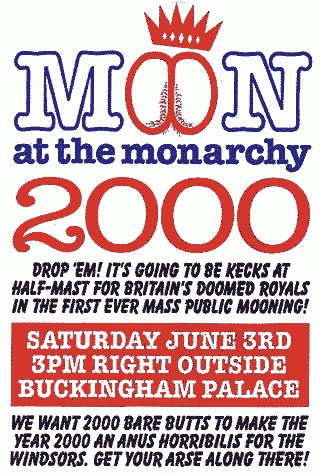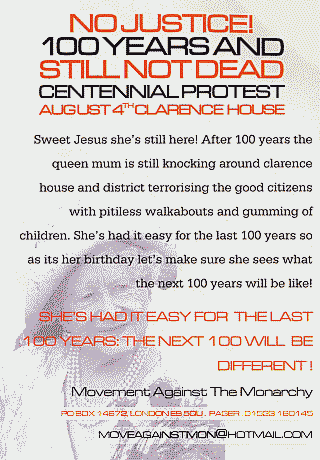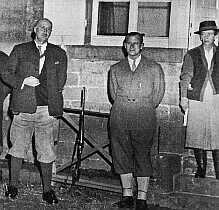 |
 |
Case Against the Monarchy
Souvenir from Mayday 2000.
© Movement Against The Monarchy
(I believe four people were arrested on the day. How much of this was pre-arranged with the authorities, I have no idea).
WWW.BIG-LIES.ORG HOME PAGE
|
NOTE Dec 28 2019: Some excellent revisionist work, notably by Miles W Mathis, has been done on monarchs as puppets, and the slow changes with time, and king-makers, and Jewish infiltration. In 2000 I had little idea of the importance of Jews as harmful agents—nor did any of the authors I consulted, in my burrowings into printed matter on royalty. Maybe in future? Meanwhile, this piece is suggestive, but not in any way complete.
RW 2019/12/28
- Criticism, or for that matter plain description, of the monarchy is absent from the academic world. This is Tom Nairn (a Scot) in his book The Enchanted Glass: Britain and its Monarchy (1988):
Middle-brow ... reflection functions to preserve the national totem-system; the sense of proportion thus expressed is then refracted upwards to the high-brow or academic sphere as simple avoidance—an integrated intellectual elite's chosen form of allegiance. Hence the remarkable result: the British Monarchy, one of the sociological wonders of the contemporary world, Europe's greatest living fossil, the enchanted glass of an early modernity which has otherwise vanished from the globe, has received next to no attention from British social theory. .. such attention as it has got consists mainly in acts of worship rather than examination.
Nairn, with the contorted writing-style induced by academic sociology, naively seems to assume this is unique; but what has 'British social theory' to say on public school education, or world empires and arms, or the Church of England, or law, or the military etc?
Nairn's book gives little evidence as to how much power (or money) the monarchy actually has—not of course easy to estimate; nor does he situate it historically. He describes in a piecemeal way things like gawping uncritical public, royal speech habits, clothing and travel habits.
- In Britain, to avoid the dangers of thoughtful comparisons in this area, little is published about the Japanese monarchy and its myths. (The Japanese had a coronation, broadcast for the first time on television, at about the same time as the much-trumpeted coronation of Elizabeth in Britain in the 1950s, no doubt accompanied by similar absurdities and nationalistic mythologies. I can't remember a single commentator pointing this out.) Or how the Italians got rid of their monarchy (they voted them out after the Second World War), or how the Swedes and others tamed theirs. There's little on the Thai monarchy, South African black monarchies, or the various more or less manufactured Arab monarchies.
- Nairn quotes an amusing remark by Laurie Taylor, a sort of pop journalist sociologist, to the effect that criminals regard the Monarchy as supreme rip-off artists. 'It's marvellous the way they kid people. Honestly, it's incredible. I watched the Duke of Edinburgh the other night talking about the Royal Yacht. It's an ocean-going liner..'
- Nairn also quotes from Dreams about Her Majesty the Queen, and other members of the Royal Family by Brian Masters (1972). 'Up to one third of the country' has dreamt about the Queen, usually [female dreamers] coming for a cup of tea and becoming miraculously ordinary or 'hopeless with money' or [male dreamers] having to be saved heroically from snarling assassins.
A novel by Emma Tennant, Hotel de Dream (1976): 'Miss Briggs dreamed she was at the Royal Garden Party. As always the Queen was quick to notice her in the crowd and, pushing past through the officious and over-protective equerries, made her way through the throng of eagerly waiting subjects to reach Miss Briggs's side..' She is the Queen's 'adviser from the common people', secretly helping her to restore a sense of meaning to life..'
- A little-known fact is the non-nativeness of the Royals; in other words, they weren't even British. (Somewhere I've seen a brief note on this subject, which seemed authoritative, but I can't relocate it). Thus the various Anglo-Saxon monarchies (and occasional Danes) were headed by invaders. The Norman conquest was from France (the Normans being something like Vikings). The Plantagenets derived largely from Anjou. The Tudors were Welsh, James was Scottish, (but originating in France) and Germans predominated later—in the Houses of Brunswick and Hanover, for example, with Albert a prominent example, responsible for introducing Christmas Trees and German bands.
Edgar Wilson in The Myth of the British Monarchy (Journeyman Books, 1989) wrote:
As to the Britishness of the Monarchy, that is a black joke. Geoffrey Bocca has interestingly pointed out that the present Queen is the first British sovereign to have British blood in her veins; and that through her Scottish mother. [G Bocca, The Uneasy Heads: A Report on European Monarchy. Note that this is 1959.] The dynastic name 'Windsor' was chosen only in 1917 at the height of the First World War by the Hanover-Saxe-Coburg-Gothas, .. to deflect anti-German feeling. When the Kaiser heard that his cousins had changed the family name, he commanded a performance of 'The Merry Wives of Saxe-Coburg-Gotha'. Prince Philip .. abandoned his traditional name of Schleswig-Holstein Sönderberg-Glücksberg for similar reasons of pubic relations expediency in 1947, and assumed the name Mountbatten, which is just an anglicisation of Battenberg.. ever since the Revolution Settlement of 1689, the British Monarchy has been the instrument of the plutocratic establishment of Britain, .. deployed to legitimise an unjust and inequitable social structure. For this purpose it has always been more convenient to have mediocre and tamed foreign princelings, 'Hanoverian Mercenaries', on the British throne. That is the real tradition..
- Republicanism in Britain reached some sort of high point in about 1870, with Bagehot's The English Constitution (1867), including remarks on the Prince of Wales as 'an unemployed youth', W. M. Thackeray's The Four Georges (1869), and Charles Bradlaugh's booklet An Impeachment of the House of Brunswick (various dates given: 1871, or 1874). Dilke battled Gladstone in Parliament. Frederic Harrison (later a professor of jurisprudence and international law) wrote an article in Fortnightly Review (all reference to which is omitted from the Oxford Companion to English Literature).
There's an idea that one of the most important British traditions is radicalism, but it is suppressed: '.. a set of values based on the ideas of freedom, equality and democracy.. [but] the very fact that an alternative tradition has been in existence for many centuries is simply not known to many people' (Benn, intro. to Writings on the Wall (1984).
-
 | Caption: 'Throughout his married life, Prince Philip has made secret trips to visit his German relations on their Estates. Here he is photographed with his brother-in-law, Berthold, after a wild boar hunt at Zwingenberg in 1959.'
[From Unity Hall's book Philip, the Man Behind The Monarchy (1987) Michael O'Mara Books Ltd, London © News Group Newspapers]Despite his name, Philip's relatives were royalty in Greece; after the Second World War they just survived a plebiscite and were permitted to return. (After the First World War, when Turkey sided with Germany, Prince Andrew of Greece, widely regarded as a pro-German traitor, was condemned to death, but was saved by British intervention.) Philip's occupation during the Second World War (I believe) was supervising painting of ships of the far east fleet. |
- Cannadine
- Edgar Wilson's book makes considerable efforts to deal with journalistic ideas about the monarchy. One such idea is that the monarchy is good for British business and tourism. His chapter can't be included in full, but typical passages include:-
- Edgar Wilson, Spain
- Edgar Wilson wrote:
Not even strict legitimacy has been maintained.. In proposing The Impeachment of the House of Brunswick.. Charles Bradlaugh was able to appeal to the fact that, out of 33 monarchs in the succession from William the Conqueror to Victoria, only 13 had succeeded by straightforward hereditary right. Students of Constitutional Law at Oxford used to be entertained by Maitland's demonstration that the House of Saxe-Coburg-Gotha had no legal title to the throne of England. Only by changing the rules could it be legitimated. [Heuston, 1964, Essays in Constitutional Law.] One monarchist, Charles Petrie, recognises that the present dynasty, 'the Hanoverians, were usurpers.. depending on a minority whose fortunes were linked to theirs, for both in 1715 and 1745 the English people had shown .. that it was not prepared to lift a finger to keep them on the throne.'
On the subject of legitimacy, an interesting possibility involves Queen Victoria—and her numerous descendants—and the rather absurdly-named genetic disease haemophilia ('love of blood'). Geneticists use Royalty to research into human genetics, because there are centuries of relatively detailed records. In about 1995 it was suggested, possibly not for the first time, that Queen Victoria could not have been the child of her 'father', who did not carry the gene, but was a substitute, her ambitious 'parents' pretending to have produced her, as a child was needed quickly to get priority. These modern journalists actually found a descendant of the duke who would otherwise have become the monarch. I think I'm right in saying this story was the province of the low budget newspapers.
- Kingsley Martin The Magic of Monarchy (1937), largely dealing with Mrs Simpson... Edward VIII ideas
and
The Crown and the Establishment (Penguin Special, 1962)
- Lead in water and Bryce-Smith
- Queen and commonwealth meeting
- One sometimes meets pro-monarchists who are aristocrats; their support for monarchy seems a little dishonest, like the support given by hangers-on, property managers, lawyers, and other beneficiaries. Presumably the idea is that one big absurdity shelters and prevents people noticing many lesser ones. I've seen what I take to be this psychology in Nikolai Tolstoy (who has a pro-monarchy website.....) and in Burford, the Oxfordian.
- Willie Hamilton, son of a coalminer from Durham, north-east England, and one of four children, autobiography in 1992 Blood on the Walls was anti-monarchical all his life.
My Queen and I (1975) was, he claimed, a best-seller: but 'some well-known booksellers in London and the provinces refused to stock it. My brother tried to buy it in Newcastle, but was told by the bookseller that he had no intention of selling it. .. that shop was still selling Karl Marx's Das Kapital and Hitler's Mein Kampf.' A passage in his autobiography looks at the Queen's assets:From time to time 'guesstimates' have been made of the Queen's private wealth. The latest have quoted astronomical figures up to £6,000 million. In 1971 the Queen's official spokesman told our Select Committee that the estimate of £50 million then being made was 'wildly exaggerated'. He must have been told to use these words by the Queen herself. Pressed to be more specific, he refused to go any further. That Committee was probably the most powerful ever set up in Parliament. The Chairman was the Chancellor of the Exchequer. The membership consisted of a former Prime Minister, Ministers and ex-Ministers, Privy Counsellors [sic] and senior MPs. The Crown refused to supply that Committee which information which it felt it had the right to have.
Parliament meekly accepted that rebuff. Unless and until some Government and some Parliament has the courage and guts to deal with the financing of the monarchy based on principles of openness, fairness, and honesty, the present unsatisfactory situation will get worse. .. The royal wealth, and the financing..., remain among the most tightly guarded secrets in the world...
The mythology surrounding the Crown Estate is one of the more obvious examples. .. we are asked to believe that virtually the whole of central London is the property of the Queen. We are further asked to believe that the profits made are 'voluntarily' surrendered by her in exchange for the Civil List, and because the profits of the Crown Estate are greater than the publicised cost of the monarchy, then we are actually making a profit out of our long-suffering royals. The Establishment has brainwashed us into accepting this bunkum.
Top of this page
big-lies.org
2000-May-8th
|


